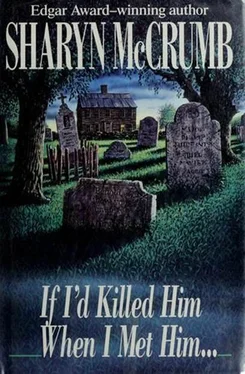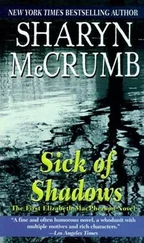“Why not?”
“Because one of the key witnesses wanted her to be guilty. Major Todhunter’s old comrade in arms, Richard Norville. He had never met Lucy before that visit, and he never saw her afterward, but still he swore that she had finished off the beignet she had given to her husband, and she suffered no ill effects. Surely, if this strange woman had murdered Norville’s good friend, he would do all that he could to see her hanged for it.”
“I suppose so,” Elizabeth conceded. “I can’t think of any reason for him to protect her.”
“By all accounts that beignet was the only nourishment taken by Philip Todhunter within days of his death; yet on autopsy his system was found to be filled with arsenic. The remaining beignets and the sugar were untainted, however. And while the entire household ate from the same batch of pastry, no one else became ill.”
“All the testimony agreed on that point, didn’t it? I don’t suppose everyone would have lied to protect Lucy,” mused Elizabeth.
“I doubt if anyone would have,” Everett Yancey replied. “Her cousins disapproved of her for marrying a Union officer. The servants didn’t care for her. And neither doctor appeared to be smitten by her charms. No one would have minded in the least if she’d been convicted. They told the truth quite grudgingly, I thought, judging from the trial transcripts.”
“All right,” said Elizabeth. “We’ll assume that the scenario was reported truthfully. Lucy Todhunter gives her husband a homemade pastry, and he dies. I don’t suppose he was allergic to it?”
“Arsenic in the corpse,” Yancey reminded her. “Besides, he ate one nearly every morning.”
“I don’t suppose his death could have been an accident of some sort?”
“Philip Todhunter didn’t think so. Almost his last coherent words were: ‘Lucy, why did you do it?’ But the question is: What did she do?”
“And all the guests ate sugared pastry from the same tray; Norville says Todhunter chose one at random from those remaining; and Lucy ate a few bites from the same one her husband ate, so that lets out the idea of the murderer being immune,” said Elizabeth. “I was thinking of a Dorothy Sayers novel, in which the murderer and his victim share a poisoned meal, but only one dies because the other has a tolerance for the poison. That would hardly work with a collection of strangers, though. Norville had only recently arrived, so he could not have built up a tolerance to a fatal dose of arsenic.”
“If Lucy had been trying to get a houseful of people immune to arsenic, there’d have been vomiting stories from half of them, since their tolerance levels would vary. That’s the tricky thing about arsenic: the fatal dose varies greatly, according to the individual. But nobody reported being sick during their stay at the Todhunter home. I think we’ll have to pronounce them unpoisoned .”
Elizabeth frowned. “That doesn’t get us anywhere, though.”
“Would you like to read my source material on the case?” asked Everett Yancey. “I don’t think you’re going to solve it over lunch. I still have my trial transcripts, and photocopies of letters, diaries, and so on. Perhaps you might find something in there.”
“I’d like to try,” said Elizabeth.
“Certainly. As long as I get to publish your results.” Everett Yancey smiled, and twirled a forkful of shrimp lo mein. “There is no such thing as a free lunch.”
The two officers from the sheriff’s department were sitting in Donna Jean Morgan’s living room, attempting to look genial, without actually accepting the repeated offers of coffee, pound cake, or butterscotch fudge. Both as a courtesy to the widow, and perhaps as a strategy toward a possible murderess, they were pretending that their visit was little more than a social call. The suspect, Donna Jean Morgan, was also pretending that their visit was a formality, because she was too embarrassed and frightened to consider any other possibility.
“You’re sure you wouldn’t like a doughnut?” she twittered again.
The older deputy responded with a plaster smile, while the young, nervous one got out his notebook and looked expectantly at his partner.
Alvin Brower decided that it was time to get down to business, but he wasn’t going to be unpleasant about it, because this was still an interview, not an interrogation. In an interview, you put the witness at ease, acted friendly, and let him do most of the talking, because you didn’t know all the answers yet, and you wanted all the information you could get, including, you hoped, any inconsistencies or demonstrable lies the witness might care to tell. The interrogation came later, when you did know all the answers, and you wanted the suspect to admit guilt. That discourse was far less courteous, and would not be held in the suspect’s living room. Brower thought he was one step closer to an interrogation now: the autopsy report had come back.
“Now, Mrs. Morgan, I don’t want to have to charge you with assault on my waistline,” he said, smiling again. “So don’t tempt me with baked goods.” Actually, the offer wasn’t all that tempting, since the last recipient of Donna Jean’s cooking was dead of arsenic poisoning. “Let’s go back over the evening of Mr. Morgan’s death again, as best we can.”
Donna Jean sighed. “It won’t change with retelling, Mr. Brower. He came here, and I fixed him a supper to take with him while he worked. I always fixed his supper. Maybe he thought Tanya Faith would take over that task, and she was welcome to it as far as I was concerned, but I don’t think it ever would have happened. Catch Tanya Faith cooking!” She smiled at the absurdity of it.
“But you were angry with your husband, weren’t you, Mrs. Morgan?”
“Chevry could be a stubborn man,” his widow admitted. “And I think he heard more instructions from the Lord than the Lord ever gave.”
“My wife agrees with you there, ma’am,” said Brower genially. “She had heard about your previous trouble over polygamy, and I’m sorry to tell you that she laughed out loud when she heard of your late husband’s demise.” He watched the widow closely for a trace of a smile.
“He didn’t deserve to die for being a graven fool,” said Donna Jean solemnly. “To my way of thinking, he deserved to live so that he could repent at leisure after he found out what a bad match he made with that teenaged slut.”
The deputies looked at each other. A new possibility had presented itself. “Was Tanya Faith helping your husband work that night?”
“She was not,” said Donna Jean.
“And she wasn’t supposed to go over and eat with him, by any chance?”
“No. Tanya Faith didn’t go out there much. I don’t think she liked the fact that it was next to the old church cemetery. She’d have had nightmares if they’d moved in, you mark my words. Anyhow, the old place wasn’t fancy enough for her yet. She was waiting for her wallpaper and her carpeting to be installed.” The older woman frowned. “She stayed here with me.”
“Did she help you fix Chevry’s dinner?”
“No more than she could help.” Donna Jean sniffed. “She may be a handmaiden to the prophet in the bedroom, but she made herself scarce in the kitchen.” She thought for a moment in the ensuing silence. “Reckon that would have changed in time. She’d have been scarce both places, but Chevry wasn’t ready to see that. I wish he could have lived for the disillusionment.”
Alvin Brower frowned at the other deputy. Donna Morgan wasn’t sounding like any bona fide killer that he’d ever met, but he’d be the first to admit that he wasn’t an expert on homicides-especially not on homicides perpetrated by women. She could be too sly to gloat about her husband’s death-or maybe she did regret his passing, but that didn’t necessarily mean that she hadn’t helped him leave this world in a fit of jealous rage.
Читать дальше












